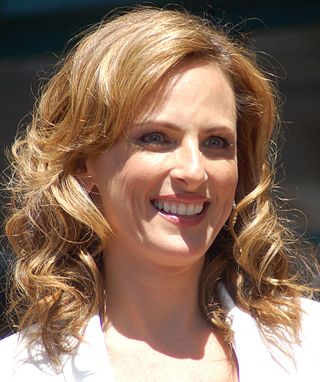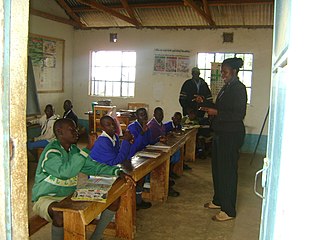Related Research Articles

Children of a Lesser God is a 1986 American romantic drama film directed by Randa Haines from a screenplay written by Hesper Anderson and Mark Medoff based on Medoff's 1979 play of the same name. It stars William Hurt, Marlee Matlin, Piper Laurie, and Philip Bosco. The film's narrative follows two employees at a school for the deaf: a deaf custodian and a hearing speech teacher, whose conflicting ideologies on speech and deafness create tension and discord in their developing romantic relationship.

Marlee Beth Matlin is an American actress, author, and activist. She is the recipient of numerous accolades, including an Academy Award, a Golden Globe Award, a Screen Actors Guild Award, in addition to nominations for a BAFTA Award, and four Primetime Emmy Awards.
Linda Bove Waterstreet is a Deaf American actress, her most notable role being a fictionalized version of herself in the PBS children's series Sesame Street from 1971 to 2002. Bove was the first Deaf actress to be a member of the program's recurring cast.
Deaf West Theatre is a non-profit arts organization based in Los Angeles, California, US. It is most well known for its Tony Award-nominated productions of Big River and Spring Awakening.
The National Theatre of the Deaf (NTD) is a Connecticut based theatre company founded in 1967, It is the oldest theatre company in the United States with a continuous history of domestic and international touring, as well as producing original works. NTD productions combine American Sign Language with spoken language to fulfill the theatre's mission statement of linking Deaf and hearing communities, providing more exposure to sign language, and educating the public about Deaf art. The NTD is affiliated with a drama school, also founded in 1967, and with the Little Theatre of the Deaf (LTD), established in 1968 to produce shows for a younger audience.

The Joan W. and Irving B. Harris Theater for Music and Dance is a 1,499-seat theater for the performing arts located along the northern edge of Millennium Park on Randolph Street in the Loop community area of Chicago in Cook County, Illinois, US. The theater, which is largely underground due to Grant Park-related height restrictions, was named for its primary benefactors, Joan and Irving Harris. It serves as the park's indoor performing venue, a complement to Jay Pritzker Pavilion, which hosts the park's outdoor performances.
The Theatre Development Fund (TDF) is a non-profit corporation dedicated to assisting the theatre industry in New York City. Created in 1968 to help an ailing New York theatre industry, TDF has grown into the nation's largest performing arts nonprofit, providing support to more than 900 plays and musicals and returning upwards of $1.5 billion in revenue to thousands of Broadway, Off-Broadway and Off-Off-Broadway music and dance productions.

Deaf education is the education of students with any degree of hearing loss or deafness. This may involve, but does not always, individually-planned, systematically-monitored teaching methods, adaptive materials, accessible settings, and other interventions designed to help students achieve a higher level of self-sufficiency and success in the school and community than they would achieve with a typical classroom education. There are different language modalities used in educational setting where students get varied communication methods. A number of countries focus on training teachers to teach deaf students with a variety of approaches and have organizations to aid deaf students.
Chicago High School for the Arts (ChiArts) is a public four–year college preparatory visual and performing arts high school located in the Humboldt Park neighborhood in Chicago, Illinois, United States. Operated by the Chicago Public Schools district, The school opened for the 2009–10 school year.

Astad Deboo was an Indian contemporary dancer and choreographer. He was considered a pioneer of modern dance in India. Through his career he collaborated with artists including Pina Bausch, Alison Becker Chase and Pink Floyd, and performed across the world.
Willy Conley is an American deaf photographer, playwright, actor and writer.
American Sign Language literature is one of the most important shared cultural experiences in the American deaf community. Literary genres initially developed in residential Deaf institutes, such as American School for the Deaf in Hartford, Connecticut, which is where American Sign Language developed as a language in the early 19th century. There are many genres of ASL literature, such as narratives of personal experience, poetry, cinematographic stories, folktales, translated works, original fiction and stories with handshape constraints. Authors of ASL literature use their body as the text of their work, which is visually read and comprehended by their audience viewers. In the early development of ASL literary genres, the works were generally not analyzed as written texts are, but the increased dissemination of ASL literature on video has led to greater analysis of these genres.
Child's Play Touring Theatre (CPTT) is a non-profit arts-education touring theatre company based in Chicago. Founded in 1978 by June and Victor Podagrosi, CPTT was the first theatre company where professional actors take original works written by children and perform them on stage. Since its founding, CPTT has performed in 40 states from Alaska to Florida and Maine to California, reaching an audience of over 4.5 million and performing the works of over 17,000 young writers.
Croatian sign language is a sign language of the deaf community in Croatia. It has in the past been regarded as a dialect of Yugoslav Sign Language, although the dialectical diversity of the former Yugoslavia has not been assessed.
The Wild Zappers is an all deaf all male dance group that combines American Sign Language, music and dance to promote the education of sign language to both Deaf and hearing communities.
Bernard Bragg was a deaf actor, producer, director, playwright, artist, and author who is notable for being a co-founder of the National Theatre of the Deaf and for his contributions to Deaf performing culture. According to The New York Times, Bragg was "regarded by many as the leading professional deaf actor in the country".
Deafness has varying definitions in cultural and medical contexts. In medical contexts, the meaning of deafness is hearing loss that precludes a person from understanding spoken language, an audiological condition. In this context it is written with a lower case d. It later came to be used in a cultural context to refer to those who primarily communicate through sign language regardless of hearing ability, often capitalized as Deaf and referred to as "big D Deaf" in speech and sign. The two definitions overlap but are not identical, as hearing loss includes cases that are not severe enough to impact spoken language comprehension, while cultural Deafness includes hearing people who use sign language, such as children of deaf adults.

Na Laga'at is a nonprofit organization founded in 2002 by Adina Tal and Eran Gur around the first of its kind in the world ensemble whose actors are all deafblind. The organization established a unique cultural center at the Levantbondet House in the Port of Jaffa in Tel Aviv. The center is a platform for creative arts, which promote equal and open dialogue and lead to social change built on the belief in the human spirit and its ability to reach out and make a change.
The Tucker Maxon School is an educational institution based in Portland, Multnomah County, Oregon, United States, which assists children who are deaf or hard of hearing, as well as children with typical hearing, in a co-enrolled classroom environment. Tucker Maxon is a 501c(3) non-profit corporation governed by a 14-member Board of Directors and managed by a 30+ member staff and faculty.
Within the realm of theatre, the deaf community is often left out. Theatre is made up primarily of movement, music, and acting. Movement pieces and dance numbers can tell a story on their own but are often assisted through song and soundscapes. While music's vibrations can be experienced, lyrics cannot be heard naturally for the profoundly deaf. Acting is often oral, with the help of facial expressions. And in musical theatre, stories are told through singing, another medium often inaccessible to the deaf. Because of the oral-based methods of producing theatre, it is typically inaccessible to deaf audiences.
References
- ↑ "Patricia Scherer, PhD". Worldabilityfederation.com. 1997-07-01. Archived from the original on 2008-12-04. Retrieved 2009-04-23.
- ↑ "International Center on Deafness & the Arts". Icodaarts.org. Retrieved 2009-04-23.
- ↑ page 143, "Cochlear Implants: The Educational Impact on Children, Adolescents and Adults
- ↑ "Northbrook Arts Commission". Northbrookarts.org. 2003-07-22. Archived from the original on 2011-07-27. Retrieved 2009-04-23.